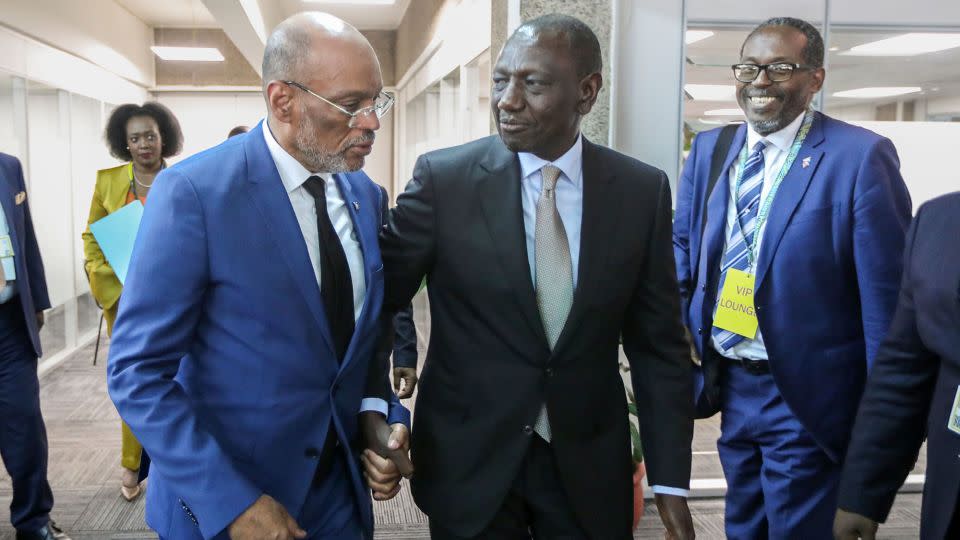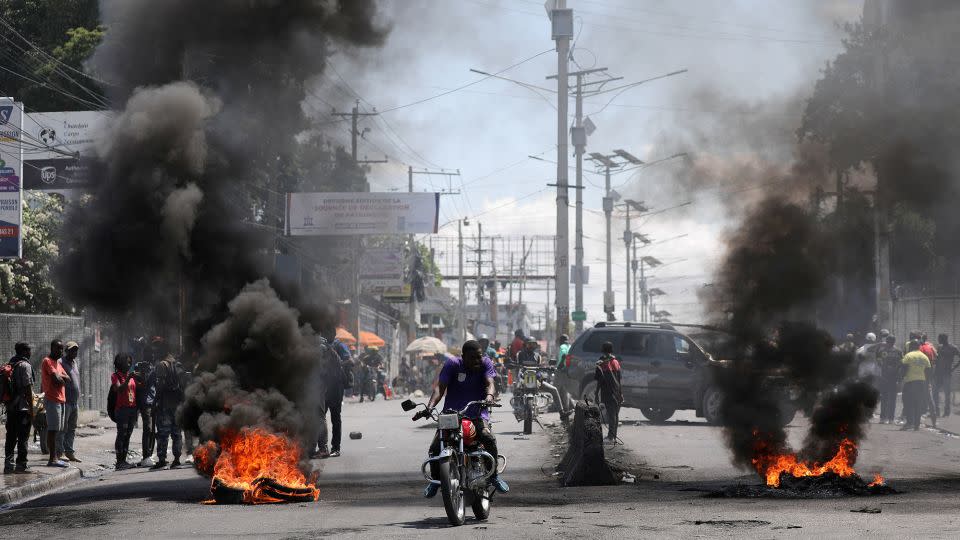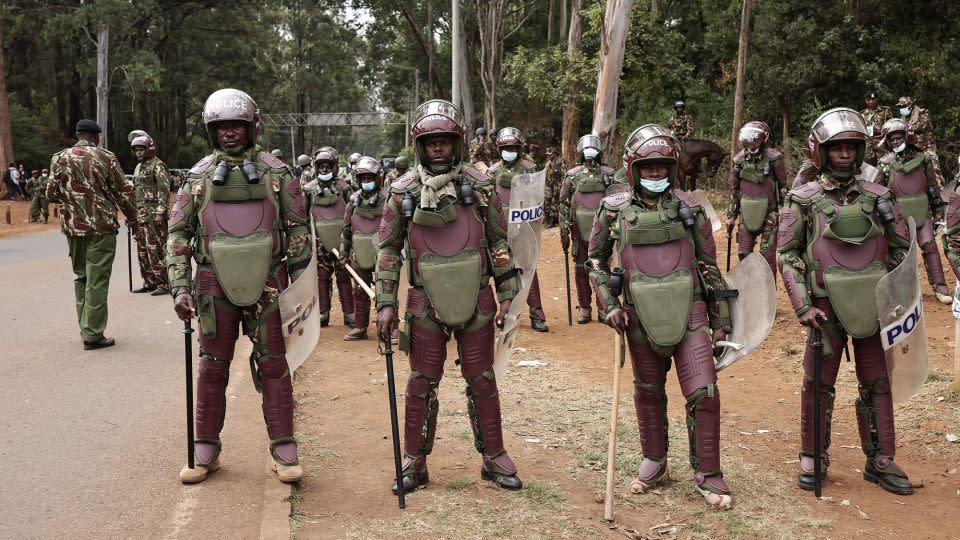Kenya’s police could be sent to Haiti to quell gang violence. Some Kenyans are bitterly opposed

- Oops!Something went wrong.Please try again later.
Kenya’s plan to lead a multinational force in Haiti as part of a United Nations-backed mission to restore order is facing intense scrutiny and resistance at home, even as violence in the Caribbean nation spirals.
President William Ruto offered to send 1,000 police officers last July to partner with Haitian police to tame the gangs that have taken over the capital Port-au-Prince and now hold the nation hostage.
But civil society and opposition groups in the East African nation accuse Ruto of trying to financially profit from the situation. They argue the Haitian deployment is unconstitutional, and that the mission requires a military force, not a police service. Many even call it an occupation.
The UN Security Council authorized the multinational security support mission in October in response to deadly gang violence across Haiti. Kenya volunteered to lead that mission, but its high court delayed the deployment of troops in January after it determined that a reciprocal agreement with Haiti was needed.
The Kenyan president worked around the judge’s decision by signing that reciprocal agreement with Haiti on March 1, witnessed by the country’s Prime Minister Ariel Henry in Nairobi. But Henry never made it back to Haiti amid the rapidly worsening security situation, and was forced to announce his resignation a few days later, saying he would leave office once a transitional council was in place.

Henry, who came to power unelected in 2021 following the assassination of Haiti’s then-president, failed to hold elections last year, fueling anger in the country.
Following Henry’s announced resignation and “the complete breakdown of law and order” in Haiti, Kenya has put its deployment of police to the country on hold, a Kenyan government spokesperson told CNN last week. Some in Kenya insist it should remain that way.
“Henry was a bogus prime minister by the time he purported to execute this deal,” Kenyan politician Ekuru Aukot, who filed the court case that led to the judge’s ruling against Ruto, told CNN. “Even the so-called agreement they claim to have signed is not enforceable in any court of law,” he said.
The document signed on March 1 has not been made public but Kenyan law requires a president to confirm that another country has similar policing laws before sending officers there.
Nairobi Senator Edwin Sifuna, who is secretary general of the opposition party Orange Democratic Movement, echoed Aukot’s argument that the deal has no legal standing.
“As a lawyer and an elected member of parliament in Kenya, that agreement does not hold any water because you signed an agreement with an entity that does not have the mandate to call itself a government,” he told CNN at his office in Nairobi.
The degree of risk for any Kenyan police officers sent to Haiti at this time of unprecedented gang violence is also under debate, despite the country’s long record of deployments to international hotspots.
Kenyan police have participated in peacekeeping missions around the world for more than 35 years. Officers were present in conflicts in Cambodia, the former Yugoslavia, Bosnia, Croatia, Kosovo, East Timor, Sierra Leone and Sudan. Kenyan police are currently serving in Somalia, South Sudan and the Democratic Republic of Congo, a government report tabled in Kenya’s national assembly said.
“In all those missions, Kenya has not lost a single police officer in any combat,” former police spokesman Charles Owino told CNN. “Kenya has well-trained paramilitary officers from the General Service Unit and the Administration Police Special Operations Group. These are officers who have both local and international training from some of the best institutions in Israel and the United States.”
Security analyst Francis Maina acknowledged that Kenya has special forces that man its borders and carry out technical missions, but disagrees that they can handle the gangs of Haiti.
“Our police officers cannot and can never be able to contain the threat of the criminality in Haiti,” he told CNN.
“It would be very tragic to send them because police officers are not military personnel. They’re not going to be there to fight,” Maina said. “They’re keeping law and order, getting people to obey the traffic rules, not to steal from people’s houses. But this is an issue whereby everybody is a law unto himself.”
Maina added that Ruto should push the UN to send in thousands of soldiers to disarm the gangs before the police are deployed to keep the peace.

Kenyan author Mukoma wa Ngugi responded to a CNN report on the planned Kenyan police deployment by recalling the Haitian revolution of 1791 to 1804, which made it the first independent black nation on earth. He highlighted “the irony that an African country is planning to ‘occupy’ Haiti. And that the Kenyan police, with their extrajudicial killings at home, will do the same in Haiti.”
Kenya’s police have often been criticized for a violent approach towards containing demonstrations at home. But Owino said there have been no complaints against Kenyan police in international missions.
Ruto announced Kenya’s offer to send police to Haiti before seeking the required parliamentary approval, then used his party’s majority in the national assembly to rubberstamp the decision in November.
During an acrimonious debate, his party’s lawmakers said Kenya should feel “honored” that the UN Security Council had called on it to help keep international peace. “When Haiti is not safe, we’re not safe,” said ruling party MP Sarah Korere.
But Sifuna and many others in the opposition say they had to raise their voices, even if they knew that they were outnumbered. “This is a president who has no regard for the law. His attitude is that it has to be his way or the highway. He has lackeys in parliament who are willing and able to enable him in his dictatorial tendencies,” Sifuna told CNN.
He is among some in Kenya who think that US funding for the mission may be behind Kenya’s continued interest in the deployment even after Haiti’s government collapsed.

The US will contribute $300 million to the Kenyan-led multinational security mission, Secretary of State Antony Blinken said last week, an increase on its previously announced support.
The issue of money came up in November’s bitter parliamentary debate. “You cannot use our policewomen and men as guinea pigs at the altar of rent seeking,” said opposition lawmaker Opiyo Wandayi. “Because we know for sure that the reason for this misadventure is money.” Parliamentary speech is protected in Kenya and he is not legally expected to defend what he says on the floor of the house.
Ruto presents the Haiti deployment as a moral mission, however. After calls this month with the Canadian and Bahamian leaders, as well as Henry, he wrote in a statement that Kenya “will remain actively involved” in the situation and “will not abandon Haiti in their time of need.”
But Aukot, a former Kenyan presidential candidate, labeled it another ill-fated occupation of Haiti that could come at a heavy cost to Kenya’s police officers. “This is a suicide mission. We’re sending them to come back in body bags. What will Ruto tell the people of Kenya?”
For more CNN news and newsletters create an account at CNN.com

